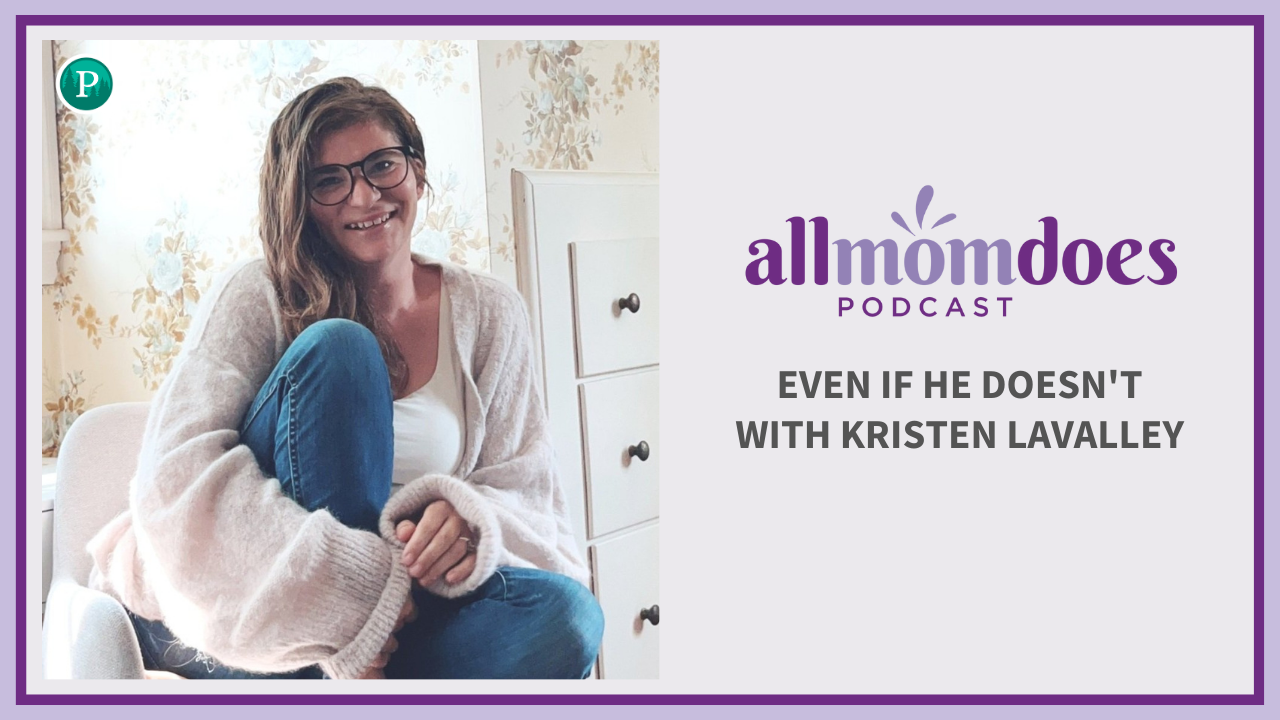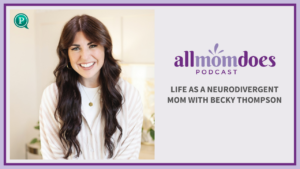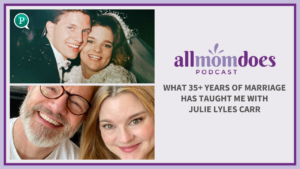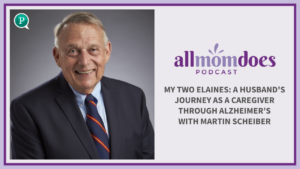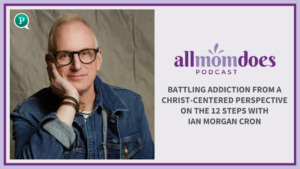Author Kristen LaValley faced an impossible situation when her pregnancy with twin girls took a turn she never expected. Discover what she learned from walking through a season of doubt, suffering, and stress in this episode of the AllMomDoes podcast with Julie Lyles Carr.
Show Notes:
Find Kristen: Online | Instagram | Facebook
Find Julie: Online | Instagram | Facebook | X | Pinterest
Find AllMomDoes: Online | Instagram | Facebook | X
Transcription:
Kristen LaValley:
It can be really challenging theologically to accept your suffering for what it is and accept God’s presence in your suffering. Sometimes it can make your faith feel really, really fragile if you admit to yourself the things that you’re feeling and experiencing and the reality of your circumstances in light of what you believed your faith would guarantee your circumstances to be.
I would say to not be afraid of that and to know that you are in great company with people who have suffered. Not everyone suffers well, but I think we can suffer together and there’s beauty in suffering together and carrying each other through these things. Don’t be afraid of it. It can be a challenging thing, but it can be a really, really, really good thing too.
Julie Lyles Carr:
Okay friend, riddle me this. We want to pray. We want to pray in ways that are full of faith. We want to believe that God can do all kinds of amazing things, and sometimes he does things the way we expect and sometimes he does not. That’s one of the reasons I’m really excited to have this conversation today with Kristen LaValley.
She’s joining me here on the AllMomDoes podcast. I’m Julie Lyles Carr, your host. We’re part of the Purposely Podcast Network. As part of our podcast, we’re always wanting to help you in ways that are helping with your marriage and with your career, with your kids, the life you’re living, and also in your spiritual life. Sometimes there are questions that come that seem both timeless and really timely. I think this is one of those. Kristin, thanks so much for joining me today.
Kristen LaValley:
Yeah, I’m so glad to be here.
Julie Lyles Carr:
Give us a little snapshot of your life. Where do you live? Who’s all involved in your life? Is there a dog, is there a cat, all that kind of stuff.
Kristen LaValley:
No animals.
Julie Lyles Carr:
All right.
Kristen LaValley:
I live in Massachusetts and I have five kids, and that is why there are no animals. My kids are, they’re 13, my oldest is almost 13, and then my two youngest are twins, they’re two-year-olds. We have a wide range of ages here. My husband and I were youth pastors and worship pastors for a really long time. We left full-time ministry about eight years ago. We’ve just been building our lives outside of that career path for the last eight years here in Massachusetts. We love it and just we have a nice little chaotic, but beautiful life where we are.
Julie Lyles Carr:
Right, absolutely. Kristin, you and I were laughing a little tongue-in-cheek before we hit the record that the topic we’re going to be tackling today is one that theologians have been wrestling for many years. In any church on any given Sunday across this country, you would hear so many different perspectives on this. When it comes to wanting to be people who believe God can do amazing things, and then also sometimes having experiences where it just doesn’t come through the way that we expected. You have a personal story about this kind of experience. Can you share that with the listener?
Kristen LaValley:
Yeah. In 2021, I found out I was pregnant with twins. It was very unexpected. Unexpected pregnancy, wanted but unexpected, and then unexpected twins. Then we found out at our mid-pregnancy scan that one of the babies had what’s called selective inner uterine growth restriction, which basically just means she wasn’t getting enough nutrients from their shared placenta to grow at a survivable rate. They recommended terminating her life to spare the life of the other baby because they were connected through one placenta. If one baby had died naturally, it would’ve caused the death of the other baby or some really serious complications for the other baby. They recommended terminating one to save the other.
We decided to just hold out and hope that God would allow us to keep both of our babies. We’re so grateful that he did. But that pregnancy was very traumatic and a lot of holding our breaths, waiting to find out if the day was going to end in death or if it was going to end in life. We never knew from day to day what was going to happen. Then they ended up being born 11 weeks early.
Julie Lyles Carr:
How was that experience once they were born? Did they end up in the NICU, I’m assuming, and you went through that experience?
Kristen LaValley:
Yeah, they were in the NICU for eight weeks.
Julie Lyles Carr:
You were kind of put in this place where you had to just wait to see what God was going to do. That to me feels like a really tentative, fragile place at times because there is that place where something comes up and sometimes there’s a pretty fast answer one way or the other. We really wanted this particular job and the door closed and we didn’t get it. That was the no. Or there was something else that happened, and we prayed really hard about it, and the outcome was what we had expected. But you really had to sit in this place of not knowing for quite a while. What was that like to have just stay and remain there?
Kristen LaValley:
It was a kind of challenge that I still have yet to find the right words to express it because it was this tension of hoping and believing that things were going to be okay, but then also having to make these really practical decisions for our family, practical medical decisions. There were all these complexities involved in this, while you’re also hoping and praying that things are going to be okay.
When they were actually born, even though they were born 11 weeks early and they’re on all these machines and they’re these little tiny two pounders, it was such a relief for me to not have to carry the weight of the not knowing every day. We got to birth, we got them out, we got them here. Now I can just, not sit back and relax, but sit back and not feel that crushing weight every day of not knowing how it was going to end every day. It was really stressful. I compartmentalized a lot. I basically just held my breath until we brought them home from the hospital.
Julie Lyles Carr:
Right. Kristen, I’m so glad that you were able to maintain that pregnancy, that the girls are here. There are other people who have different stories. They were praying the same prayers you were praying, and they were having the same kind of faith you were having. What did that experience, knowing that there were so many different outcomes that could have been the case, and knowing there are other people who experienced those outcomes, how did that impact the way that you see your relationship with God?
Kristen LaValley:
I don’t want to say there’s guilt in it, but there’s just this unknowing that I have and will always have of why God allows miracles sometimes and other times he doesn’t. I’ve also sat in the ashes of not getting what I prayed for. It’s this tension of being grateful and acknowledging how fragile life is and how there are no guarantees.
One of the things that I said a lot after the girls had come home and they were cleared of all their medical concerns was he didn’t have to do this, but he did. I don’t know why he did. I don’t know why he chose our daughters, because most people who have all the factors that we had, their story doesn’t end up the way that ours did. I feel that so intensely as a mother and as someone who knows people who have had different endings.
When you go through something like this, all the people with similar stories kind of come out to encourage you and hold you and give you advice and stuff, so now I have these close relationships with people whose story didn’t end up that way. I don’t really know what to do with that. I think it’s okay that sometimes we can just say, “I don’t know. I just don’t know.”
Julie Lyles Carr:
Right. I’ve had the experience myself. I have two children who are differently abled. One of the experiences that I began to understand early on once the girls had been identified, one with significant hearing loss, one with cerebral palsy, was the number of people when I would speak publicly about the experience of raising them, the joys, the challenges, all the things, Kristen, every now and then, there’d be someone, this doesn’t happen all that often, but every now and then there would be someone who would say, “You haven’t prayed hard enough for their healing. Why are you accepting these differences in them?” Even as I was trying to say, “I know that God has them here perfectly as they’re supposed to be, they are exactly who he intended.” That part of the message would get lost occasionally with some people.
What it reveals to me, and I still am guilty of this myself, so that is no finger pointing at anyone, but what it reveals to me is the transactional approach we often have toward God in our prayer life, the transactional approach we have in our faith. Meaning that, well, if I can just do these things correctly or well or check these boxes or feel the emotion big enough or whatever the thing is, then God will be compelled. He will have no choice but to do it the way that I want to do it.
How does that type of thinking sneak into our faith? How do we get that separated out from the mystery that is faith? Because on the one hand, faith should be big, it should be bold, it should be kind of audacious. But on the other hand, we can slip so easily into this transactional type of thing. How do we unpack all of that?
Kristen LaValley:
In a podcast, I don’t know.
Julie Lyles Carr:
I said, we’ve got 30 minutes to unwind all these theological questions.
Kristen LaValley:
Oh, man. I think just we pick these things up subtly and we pick them up. We hear about a miracle and we say, “Wow, that mother had so much faith and God honored her faith.” It’s something that you say to honor that experience and to give God glory for that experience. But then the implication is that if she hadn’t had enough faith, it would’ve ended up differently. Then we adopt these theologies accidentally and start looking at God as somebody that we can move. If we can’t move him, it’s our fault. It’s our responsibility. Just pray louder, give more tithe, do all these things that we think if we check all the boxes-
Julie Lyles Carr:
[inaudible 00:10:57]-
Kristen LaValley:
He owes it to us. When really God is not a transactional God. He is just God. He’s sovereign and he’s holy. The things that we do can honor him, but his glory is in himself, whether we get a victory or not.
Julie Lyles Carr:
Right, right. I think too that there are pivotal times that we may not think of it as transactional until we have a need that there’s something that we really, really want to see the outcome in a certain way and very understandably want to see the outcome in a certain way. Of course, to want to be able to have both of your girls. The different things that we pray for that really are at times life and death. I mean, these things are really important, and yet somehow we can get trapped in this currency that can then leave us on the other side. If it doesn’t turn out the way we want, can leave us doubting everything.
What do you say to that listener who says, “I did all the things, I prayed all the things, and I tried to be accepting of what the outcomes were, but now I’m left feeling like God’s left me exposed, that he didn’t hear me. I don’t have a way yet to spin this into some kind of, oh, but my faith has grown,” what do you say to someone who’s living in that season?
Kristen LaValley:
The best thing that you can do in that season is to engage with those feelings and those emotions and those doubts, and to be honest about them and not try to patch them over with some kind of theological pithy phrase. But to just be really honest.
The best thing that I ever did was just say, “I don’t care anymore about if God is going to strike me down if I say the wrong thing. I just have to be honest.” I was so honest with God and just my prayers were more accusations and anger and how could you do this? I did the right things. You said if I do this, you would be there.
When I was that just like ash and bone in front of him, he met me there in that anger and in that frustration. I think the only reason my faith was saved in those times was because I was so brutally honest with him that I was vulnerable enough that when he came and met me there, I couldn’t help but acknowledge how present he was with me in those moments. If he was with me in those moments when I was angry and accusatory, how much more is he with me all the time? So be honest, engage with your pain and engage with your doubts, and don’t be afraid of what will happen if you do because it could end up being the best thing for you.
Julie Lyles Carr:
I do think we have biblical precedent.
Kristen LaValley:
Sure.
Julie Lyles Carr:
I mean, I was reviewing recently the story of Jonah. His story is very interesting because God asks him to go do something, tells him to go do something. He goes the opposite direction. He ends up paying the consequence. But what’s fascinating is there’s all this good that comes out of him finally going to Nineveh and telling the people about God. God shows, then, incredible grace. And then Jonah gets upset all over again on the other side of that. He’s very honest with God. We see Isaiah be extremely honest with God. We see Elijah and Elisha and David and Solomon. There are a lot of examples in scripture of people who have wrestled things, wrestled with the outcomes, wrestled with the way that God either answered or seemed to not answer, in some cases. We do have precedent that we can say those things and be really, really honest.
Now, Kristen unpack for me when we walk through something, even if the outcome is what we had hoped for, the journey of going through that still leaves a mark. Even when something ends with what we would hope the end of the story would be, there’s still the trauma of what happened and what the experience was. What do we do with that? That is one of those things that is so odd to try to hold in tandem. For example, your girls made it, but it also means you didn’t get to have a joyous pregnancy, a pregnancy that was looking forward instead of in this moment to moment, hour to hour kind of panic. What do we do with the trauma on the other side of the experience?
Kristen LaValley:
Trauma affects your mind and your body and your nervous system in ways that aren’t changeable just because the outcome is okay. It’s like if you break an arm, your arm will have always been broken, but you still have to treat it and heal it and wear a cast. You can’t just say like, “Oh, it’s over. I broke my arm, just going about my life.” You have to take the time to let that arm heal. Trauma is the same way. It doesn’t matter that things end up okay. The trauma has already affected you in the moment, and it affects you indefinitely until you heal it.
I think sometimes we feel guilty if we got what we prayed for and things are still not okay internally. That was my experience when the girls came home. As soon as they came home, that’s when my nervous system just went berserk because I could finally breathe. That’s what trauma does. It kind of holds out until you feel safe, and then you start feeling the effect. All of these things that I held back on because I was holding my breath, as soon as I could breathe, my mind just went crazy. It was so hard to reconcile that.
I remember one time I prayed, “God, if everything was always going to be okay, why did it have to hurt so bad? Why do I have to be the sacrifice? Why does my mental health have to be the sacrifice? If this was always going to be okay, if this was always your plan, why do I have to hurt so much?” I don’t know the answer to that, but I know that we cannot ignore what trauma does to us, and we can’t feel guilty that we’ve been injured by a bad thing that happened to us.
Even if that bad thing wasn’t strictly physical, our minds and our spirits are affected just as much and we need to take the time to heal those. For me, it was going to some pretty intense PTSD therapy and creating a lot of boundaries in my life and just really engaging with every emotion, every breakdown, every panic attack, and just allowing myself to feel it and process what I was processing so I could set it aside and move on to the next thing. It took a good 18 months before I could function without being triggered on a regular basis.
Julie Lyles Carr:
What were some of the things that you put in place for yourself as a boundary? What were some things that really helped your nervous system heal?
Kristen LaValley:
There were simple things like packing away books that I had read to the girls in the NICU. That when we had them out, if I saw them or if my husband was reading them would send me into an angry, triggering spiral. It was saying no to going different places and being in environments that were overstimulating. They didn’t have to have anything to do with what we went through, but once your nervous system is fractured, there are just a lot of things that can continue to make that nervous system work over time. I had to make a log of all the things and environments and conversations and people, and even food and drink that were making my nervous system work harder than it needed to. I learned to get really good at saying no and to not feel bad about that.
Julie Lyles Carr:
I think those are the things sometimes that when we come through something, particularly if it turns out the way we want, people think that’s the period at the end of the story. Often, yes, we can be super grateful for the outcome, but the impact of what taking that path was, it makes me think about as a distance runner, when I would do half-marathon, there were days of recovery after, even when I ran my best time or felt like it was a beautiful day or I had an incredible experience with my running partner or whatever. The days after, there was recovery that was required even in the midst of a great outcome. I think often we don’t give ourselves the grace to have that moment, to take a breath and realize that that’s there.
How have you reframed? What is a new framework for you? When you think about suffering, the role it plays, the role we don’t want it to have to play, how do you look at all of that now in light of the journey you went through?
Kristen LaValley:
I see suffering now more as an invitation. Maybe not in the moment, but reflectively, I see suffering as an invitation to know God more, to know ourselves more. An invitation to be with each other in a more intimate and Christ-like sacrificial kind of way. Because stepping into suffering, someone else’s suffering, can be really impossible and challenging, and you can’t help but get some of their ick on you.
It’s probably one of the most difficult, challenging, exhausting things about being a believer is that we’re called to care for each other. When someone is suffering, you can just not want to. I don’t want to get involved because it’s going to cost you. Now when I think about suffering and I look at suffering in the lives of other people, I have so much empathy and compassion for them, and I know how beautiful that experience of suffering, the beauty that can be produced out of it.
It’s hard for me now to look at suffering in the same way because it’s created so many beautiful things in my own life and brought so many beautiful relationships and has healed so many parts of me that had nothing to do with the suffering. But because I’ve suffered, I was able to forgive and move on and have empathy and compassion and move forward in my life. But in the moment, suffering is just awful. You just can’t see any good in it in the moment. But reflectively, it’s an invitation for beauty and intimacy, for sure.
Julie Lyles Carr:
Right. Let’s go to the pragmatic of you had other kids at home when you were having this extremely intense, anxiety-producing pregnancy, then you had those weeks in the NICU. Practically, how did you keep family life going? How did you stay in the mommy lane when I would have to assume you just wanted to call a full stop to a lot of stuff?
Kristen LaValley:
There were multiple layers of complications there because we were also coming off the road from traveling in an RV for a year, so we didn’t have a home, and we didn’t know that we were entering a housing crisis that year. We were just fully uprooted. I didn’t want my kids to feel the trauma of what was happening in the moment because I was so hopeful that things would be okay. I didn’t want them to have that anxiety, so I really tried to keep them out of it and compartmentalized everything that was happening, which ended up not being a good thing for me. I don’t know Jerry’s still out on if that was good for them or not, but for me, it caused an emotional disconnect from them because I wanted to protect them from myself and from feeling what I was feeling.
It was very much like my husband took the reins. He took over, and I was like a peripheral person because there were so many appointments, there were so many things going on, and then I was hospitalized for a couple weeks at the end, so it was very much like I just disconnected because I thought that that would be better for everybody. Then when the girls came home, it was a long time building back that emotional relationship, relational connections with them because I wanted to protect them, but everything comes at a cost, so it was really challenging. It was a lot of guilt and therapy to get through that.
Julie Lyles Carr:
Right, to rewind all of that. What was one of the most helpful things someone did for you within the context of community, within the context of loving you and supporting you during that time?
Kristen LaValley:
Easy, feeding me, every time. Bringing over food, sending over DoorDash gift cards, sending a Venmo and saying, “Hey, get pizza tonight.” Taking to decide about what you’re going to feed your family every night off the table is the biggest grace that you can give to somebody in crisis. 100%, without a doubt, full stop. Easy, feed them.
Julie Lyles Carr:
It’s funny because that’s been a go-to that sometimes we have poo-pooed a little bit, oh, well, the church ladies in their casseroles, depending on what’s going on in somebody’s life.
Kristen LaValley:
Bring all the casseroles.
Julie Lyles Carr:
Bring all the casseroles. That can be one of the best things and take that decision off the plate. What is something looking back now? Now, obviously it’s difficult to look back without the filter of things turning out and your girls got to come home. But what is something now looking back that you think, I probably would do that differently? Or if someone were to enter this kind of situation or this type of season, here’s something I would tell them to do that maybe I didn’t do for myself?
Kristen LaValley:
Oh man, I don’t know. I think you just do the best that you can do in the moment, and that’s all that you can do. I hoped I would’ve offered myself a little bit more compassion and been a little bit more easier on myself and allowed other people in to feel it with me, instead of feeling like I needed to protect everybody or that I needed to block people out who weren’t giving me what I needed emotionally. I was so afraid of falling apart that I just pushed people out who weren’t immediately helpful to me. I wish I would’ve had a little bit more grace on other people and grace on myself to invite people into the experience a little bit more.
Julie Lyles Carr:
Right. Tell me about the process of writing, Even if He Doesn’t, which is your debut book that’s coming out. You talked about that you were having to be careful to not give yourself all these triggers because of what you’d been through, the therapy you’ve been through, and now here you are writing a book about a lot of these experiences. What was that writing process like, because that’s some pretty hefty healing or digging stuff up. How’d that go?
Kristen LaValley:
Yeah, it was both. It was brutal. There were days where I would write for a couple hours, and then just sleep for the rest of the day because I was so emotionally exhausted. It was cathartic in a lot of ways because I hadn’t verbally processed a lot of the stuff that I wrote about, except in therapy, but I hadn’t really processed it in a linear type way, like how you see the story play out in the book. It was really cathartic to write that out, and then read it back to myself. But it was also really emotional. I actually didn’t read the book to myself again until I recorded the audiobook, which was a mess. Also, very emotional to hear myself reading all these stories again. But it was good, but it was probably one of the most emotionally draining things that I’ve ever done. Good, but hard.
Julie Lyles Carr:
Right, right, right. The process of writing, also, one of the things that’s really powerful about it is you in many ways have to synthesize what the lesson is because you’re trying to impart that to your reader. Particularly in memoir, this is not necessarily intended to be a memoir, but it does have that memoir element because you’re talking about your story and the experience that you had. At the end of the day, what did you discover? In synthesizing all of that journey, what did you discover were the takeaways you want your reader, the listener to the podcast, the listener to the audiobook, what are those takeaways?
Kristen LaValley:
That’s a great question. I would say to not be afraid to suffer and don’t be afraid to engage with your suffering. It can be really scary, especially if your theology has promised you a certain outcome and the outcome is not what you are living in. It can be really challenging theologically to accept your suffering for what it is and accept God’s presence in your suffering. Sometimes it can make your faith feel really, really fragile if you admit to yourself the things that you’re feeling and experiencing and the reality of your circumstances in light of what you believed your faith would guarantee your circumstances to be.
I would say to not be afraid of that and to know that you are in great company with people who have suffered. Not everyone suffers well, but I think we can suffer together. There’s beauty and suffering together in carrying each other through these things. Don’t be afraid of it. It can be a challenging thing, but it can be a really, really, really good thing too.
Julie Lyles Carr:
We’re a culture that tries to minimize as much as possible. Suffering tries to minimize discomfort, tries to minimize inconvenience. When I think, as a culture, we experience things that are really hard in a culture that often promises us all kinds of solutions, whether we’re people of faith or not. Oh, well, modern medicine is miraculous, and you shouldn’t have to wait longer than 32 seconds to wait for a member services representative to answer the phone or … We aren’t a culture that knows how to wait. We aren’t a culture who knows how to sit in our discomfort. How do we begin to learn that? How do we allow ourselves to begin to grow that muscle a little bit so that maybe we aren’t quite as undone when bigger things come along? Because, boy, if we can’t deal with some of the more minor things in life, then how are we ever going to have some of the strengths that we would need for some of the bigger stuff?
Kristen LaValley:
I think suffering builds those muscles in itself. Every time you go through something difficult, your capacity grows a little bit more. I went through a lot of hard things before we walked through what we walked through with the girls. I think that those hard things and engaging with them honestly, and engaging with my faith and my theology and adjusting and really digging into what I believed and accepting when I was wrong and changing what I believed when I found those things to be wrong, is what helped me get to the point where when the doctor says, “You need to abort if you want this other baby,” I was able to say, “Even if he doesn’t save our daughter’s lives, I’m not doing that because I trust him and he’s sovereign.” At that point, I had engaged with my faith and my doubts and my fears and my suffering and my pain so much that it made the faith that was able to say that. I think your capacity and your strength and the depth of your faith increases as you engage with those things and not run from them.
Julie Lyles Carr:
Well, the book is called Even If He Doesn’t. Kristen, congratulations on this debut book that you have coming out. Where can the listener go to find out more about you, more about your work and hear more of your family’s story?
Kristen LaValley:
Best place is to follow me on Instagram, and that’s just my name @kristen.lavalley.
Julie Lyles Carr:
Kristen LaValley, alrighty. We’ll get that in the show notes. Kristen, thank you so much for taking time today to share with us such an amazing story and your honesty and transparency about what that journey was like. Thanks so much.
Kristen LaValley:
Thank you.
Julie Lyles Carr:
Listener, go to the show notes to find the links for the things that we’ve been talking about to find where you can connect with Kristen. Rebecca puts those together each and every week. We love it when you come over to AllMomDoes.com, which is a great online home for you to find other people who walk in community with you, other women who are in your seasons and stages of life, asking the questions you’re asking, all the things. There’s also AllMomDoes on Instagram.
I’m over on Instagram as well, Julie Lyles Carr. I’d love to connect with you there. Be sure, we would love it if you would go over and give us a five star rating and review wherever you get your podcast. Make sure you’re subscribed and share this link with someone who would benefit from hearing from Kristen’s amazing story and her wisdom. I’ll see you next time on the AllMomDoes podcast.
Follow this podcast:

